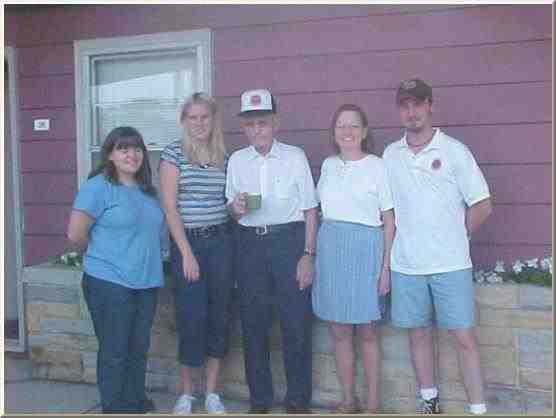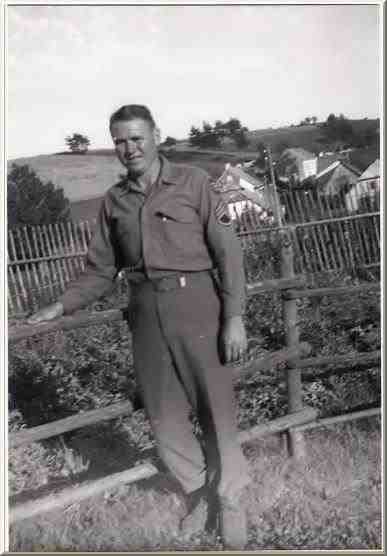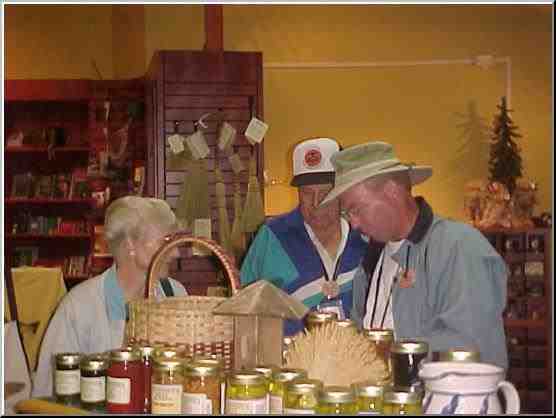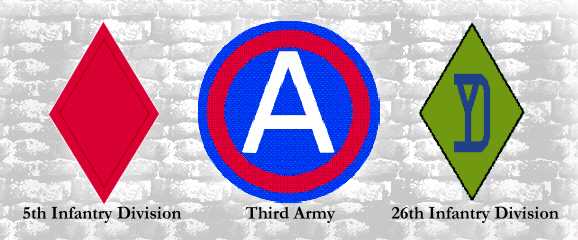 T4 CECILLE E. WAX - Hdq Co.
T4 CECILLE E. WAX - Hdq Co.
"The bombed out towns. The large piles of bricks that were one time buildings. Lots of people with nothing to eat."
standing in center
Medals and Special Honors I received while in the Army
- Good Conduct
- World War II Victory
- European-African-Middle Eastern Campaign
- American Campaign
- Bronze Star
- Army of Occupation of Germany
1. Some funny things I remember about the war:
Nothing funny. The night the delayed fuse bomb went off. Hasting took off in the dark and dove into what he thought was a ditch. It turned out to be an old W.W.I trench. The Germans had been using for a latrine. Talk about odor. We asked him to sleep in the truck cab the rest of the night.
2. My memories of the way we lived in Europe:
Sleeping in fox holes under the old truck. Watching women cut hay, etc., with a scythe. Two-wheeled carts pulled with steers. Lots of dead animals. The French waving when we went through some of the towns.
3. My most vivid memories from World War II:
Seeing dead American boys laying along the roads. Hauling a truck load of dead German and American soldiers back to the G.R.O. The bombing at Verdun. The Battle of the Bulge. How cold it was and getting supplies to the gun company through all the snow, ice, etc.
4. My memories about the conditions of the countries I was in during the war:
The bombed out towns. The large piles of bricks that were one time buildings. Lots of people with nothing to eat.
5. Something from the war that is difficult to talk about, but I'd like future Americans to know:
Count your blessings. Nothing is free. Never forget what our freedom has cost in blood, sweat and tears, before, during and after the birth of our beautiful nation, th U.S.
6. In spite of the hardships of war, I am proud to have served my country in World War II because:
We all saw first hand the horrid ways of Hitler and the slave labor. Looking back, you realize how lucky we were to come back. 292,000 of our buddies didn't and 671,278 were wounded.
7. My message to my lifelong Buddies in the 818th:
Thanks for the memories. I hope you all can come to Iowa this summer. It's been an honor to know and serve our Country with you.
An article from A History of Military Service in Montgomery County, IA. 1996
pp180-181. Dennis & Lorene Neal, Eds.
Cecille E. Wax entered the service on 24 June 1942 and served 3 years, 3 months and 20 days. "I was discharged 13 October 1945.
I served in the U.S. and the European Theatre of Operations and earned the European-Middle Eastern Ribbon, Good Conduct Ribbon and Bronze Star Medal. I took part in the Normandy, Northern France, Ardennes, Rhineland and Central Europe Campaigns.
Upon finishing basic I was assigned to the 818th Tank Destroyer Bn., September 1942. On 20 October 1943 we boarded the U.S.S. Fairisle Army Transport. We disembarked and moved by rail to Dundrum, County Down, Northern Ireland on 1 Nov. 1943. On 30 April 1944 I was in the advance party that moved to England. The main body arrived May 14th.
On 14 July 1944 we arrived at Utah Beach, Normandy, France. I was surprised at the small area in U.S. control. We moved in only 5 miles.
We received our first heavy shelling on 17 July. We dug real foxholes about 3 feet deep and long enough to sleep in, then covered up with logs and dirt. One day, we received an air burst, two fellows dove into a foxhole face down, and then a fellow about 6'4" weighing 200 pounds dove in on top of them and was stuck. After much pulling, lifting, laughing and receiving lots of complementary adjectives, we got them out of the foxhole.
After breaking out of the hedge rows around 31 July, the entire front was moving so fast that the Battalion had difficulty knowing where the companies were at all the time.
August 3rd to 5th we passed through St. Lo and Averances, France. The roads were lined with hundreds of burned out vehicles. We met heavy enemy action from there to Reims where we crossed the River Marne on a pontoon bridge. After going through the Argonne Forest we advanced on a high hill on the edge of Verdun. We received a heavy bombing by the German Air Force that night. A bridge and hundreds of barrels of gasoline just down the hill from us seemed to be their target.
They surprised us by dropping one large bomb with a delayed fuse. It went off and my assistant driver took off in the dark and dove into a ditch. It turned out to be an old WWI trench that the Germans had used for a latrine. Talk about odor! We requested that he sleep in the truck cab by himself the rest of the night.
Time passed, the same old ups and downs. We stayed in a Catholic Seminary where heavy fighting must have taken place. Some bodies had to be moved before the doors could be opened. They loaded all the bodies in my truck, both Americans and Germans which were dropped off at G.R.O. on the way back after supplies.
On 19 December we entered the Siegfried Line. On 20 December we received orders to move to the Battle of the Bulge. We moved at night about 35 miles and arrived in Klien Bethgen, Luxembourg at 2330 hours. It was 6 degrees below zero with lots of snow. We spent Christmas in Redance, Luxembourg. Many of the roads were blocked by snow and by land mines. Getting supplies to ground companies was a nightmare.
On 28 January 1945 we started back south to near Boulay, France. In February all the old M10 T.D.s were turned in and new M36 T.D.s were drawn. They had 90 mm guns.
On 25 march we arrived at and crossed the Rhine River. That is where I saw my first German jet fighter plane.
During the month of April we advanced across Germany a distance of 433 miles. We arrived and stayed at Tittling, Germany until the official end of the war. On 12 May we moved through Austria to Kiensberg, Czechoslovakia. There we stayed until 12 July, spending our time gathering up around 4,205 prisoners of war.
Our Battalion was placed in Category IV which meant we were to be demobilized. I started home the first of September and was discharged at Ft. Sheridan, Illinois.
The last 6 months we, "the living" have heard much about heroes and sacrifices that were made by all. Much has been said about D-Day, our freedoms and constitutional rights, etc. There is no way we can thank those who made the greatest sacrifice of all. If you disagree ask one of the millions who have heard those heartbreaking and gut-wrenching words, "We regret to inform you, your son, husband, brother, etc., has been killed in action."
We also know they will never say, "I'm going, or will ever go, to the greatest place in each of our worlds, 'Home'." The next time we hear or sing 'God Bless America' let's all remember who made it possible.
We, the 818th Bn., had our 38th reunion in Yankton, South Dakota. Next year it's in Hartford, Connecticut.
Cecille was Tech. 4 when he was discharged. He lives in Shenandoah, Iowa.





 Sgt. CURTIS A. CROOK - Hdq Co.
Sgt. CURTIS A. CROOK - Hdq Co.




